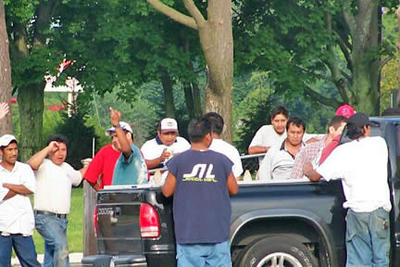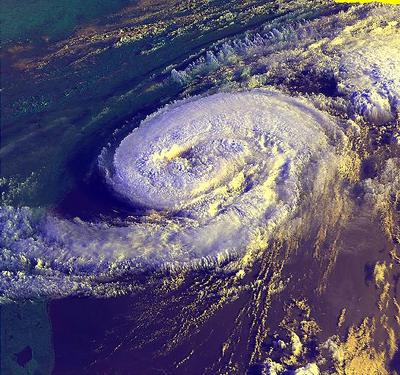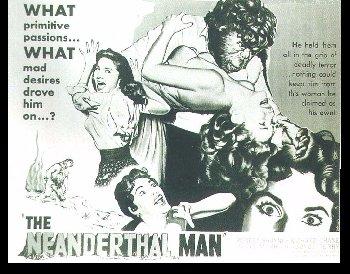Friday, September 30, 2005
Tuesday, September 27, 2005
The New Meritocracy and the Poor
 Day Laborers in New Jersey
Day Laborers in New JerseySometimes googling turns up some funny stuff in the "sponsored links" section.
I punched in “day laborers” and got two automated ads, one from ebay and the other from Kadazzle.
The first one read: “Day Laborers for Sale. Low Priced Day Laborers. Huge Selection!” The second read: “Compare Prices on Day Laborers and Save Money!” Somehow appropriate, I guess, for a post on class, culture and poverty.
OK, let’s get back to the aftermath of the hurricane and prophetic responses. This one is a bit longer because the topic is so complicated. Sorry about that. Think of it as a two posts for one deal.
Here are some too simple takes:
• A powerful multi-ethnic and dual gender meritocracy has arisen in the U.S. over the past few decades. A multi-ethnic and dual gender underclass is expanding at the same time. Diversity and a certain kind of priveleged racial reconciliation win but for the poor it may be the same old same old.
• Class and culture currently play a more significant role than race in perpetuating poverty. In fact, when people talk about “race” I think what they usually mean is “class and culture.”
• It's time to shake free of old school racial analyses of the American underclass and get a sharper picture of the importance of class and culture in perpetuating poverty, and a better picture of how the new meritocracy thinks and feels about the poor. Without that shift it could be hard to reduce the number of poor people in the U.S and improve the lives of those who remain in poverty.
The Oppression Model of Poverty
A generation ago most thoughtful people identified with what I'll call the oppression model of poverty. In short, they thought that poor people were poor mostly because people with influence and power did them at most every opportunity.
And during that time a lot of people thought racism was the heart of that abuse of power. In that model the powerful white upper and middle classes justified their systemic oppression on the basis of the supposed inherent biological inferiority of African-Americans or other "non-white" groups.
That's not to say that popular thinking in those days wasn't more subtle than the simple old school model suggests, but I think it gives a fair picture of people's basic 'worldview' of poverty from just after WW2 until the 1980's.
The Centrifuge Model of Poverty
I think a very different new school 'worldview' on poverty began to get up and go in the 80's and became the predominant way people understand poverty and society now. I'll call that new way of perceiving things the centrifuge model of poverty.
Scientists use laboratory centrifuges to separate out substances in test tubes from one another. As a centrifuge spins at high speed, various particles become “segregated” from each other due to their inherently different sizes, shapes and densities.
The centrifuge in this case is a highly competitive, American society built on the idea of meritocracy. As that societal centrifuge spins the winners get loose from the losers and the strong spin safely away from the weak. A natural segregation occurs as those without the “right stuff” remain in or descend into poverty while the others enjoy the economic and social benefits of their natural and social advantages.
As harsh as it can sound to some people, you've got to hand it to this model. It’s got deep roots in American soil because it has some important similarities to the old Puritan idea that God economically blesses the good with abundance and punishes the bad with poverty. But it’s different and even more powerful because it adds the critical elements of meritocracy and competition, both of which are also powerful—even totemic—American values. For all those reasons it packs a serious punch.
Again, most thoughtful people don't see things so simply, but I do think this new intutive "road map" of poverty and society lies behind a lot of the current discussion of poverty and the social policy meant to alleviate it.
The Rise of the New Meritocracy and the Expanding Underclass
Whatever intuitive road map folks might use to understand poverty and the poor, some developments are pretty clear to most fair-minded people right now.
Poverty's gotten worse over the past 4 years in the US in terms of percentages of people in poverty and in real terms. The appalling social situation of so many people in New Orleans didn't surprise any of us who have lived and worked in American inner cities. The hurricane exposed it in a new way.
And the expanding underclass continues to become even more diverse. African-Americans and Latinos are disproportionately represented, but whites make up the majority of the poor. In fact, the expansion in the numbers of the poor in the past 4 years has occured primarily among rural "trailer trash" whites. Women and children make up large percentages of the underclass.
The gaps between the middle class and the poor, and particularly between the well off and the poor have been getting a lot wider. In 1965 the typical CEO made 24 times as much as the average worker. Today that figure is 184 times as much. That would have been considered immoral and even obscene 40 years ago. How has it become acceptable now? Perhaps a change in world view?
Two longer term trends also contribute in a major way to the expanding numbers of the poor. The loss of a manufacturing based economy drove many people who previously worked at better paying jobs into low paying jobs with few benefits in the service industries. A lot of poor people, maybe most of them, work silly hours but still can't make ends meet. And the continuing flow of illegal immigrants swells the numbers of the poor while our government can't figure out what to do with lots of people who are simply looking for a better life.
We've also seen a steady effort on the part of our current political leaders to cut proven and beneficial programs for the poor while getting close and personal with the rear ends of the wealthy through dubious tax cuts for the rich and egregious pork.
Katrina stopped that momentum temporarily because people are now aware of poverty again and political leaders risk voter backlash if they press further cuts at the expense of the poor. But the ideological convictions of the congressional majority haven't changed. Americans have consistently voted over the last ten years for congressional leadership that clearly and obviously favors the "haves" and ignores or even punishes the "have nots" through cuts and the elimination of valuable and proven programs and approaches that help poor people better their lives.
But I think another very important development is making a decisive contribution to the current look of poverty in the U.S. I'll call that young thing The Rise of the New Meritocracy.
I believe the new school/centrifuge thinkers are right that America is far more competitive and meritocratic than ever. Large and thriving African-American, Asian-American, and Latino middle classes and even upper middle classes have arisen in the past 40 years, and woman have far more opportunities than ever before. Those are astonishing American social success stories by any historical standard.
This multi-ethnic wave of men and women, most 50 years old and younger, share a core set of values. They value competition, efficiency, meritocracy, entrepreneurship, education, and family stability. By and large, they're comfortable in an information economy. They're the new economic and cultural bedrock with potentially the greatest political influence of any group beyond the rich. Both major parties are desperately trying to win them over. The conservative Republicans, with their recent and pivotal victories in the entrepreneurial exurbs, got out to an early advantage.
But the new meritocracy has also chosen to segregate itself from the urban and rural underclass. The educated white middle and upper middle class mostly abandoned the poor long ago, and now this new class is following the same pattern. African-Americans, Asian-Americans, and Latinos who identify with this new "culture" and "class" have largely left the ghetto and the small town in the rear view mirror. The immense creativity and economic resources and social capital of this new class aren't--in most cases--being invested in efforts to shrink the growing American underclass.
Here's something ironic about this new class. Though it's been forged by a greater cultural emphasis on opportunity and meritocracy, the new meritocracy may be creating greater and even more impenetrable class barriers. There are clear signs, outlined in a recent series in the NY Times and in various articles in The Economist, that America is becoming more class stratified. The old American value of upward mobility and the cherished myth of the American Dream may be threatened.
Why? These new meritocrats pass their centrifuge friendly values to their children and concentrate heavily--in a way no previous American generation has done--on the education of their own children, sparing no expense or effort and often placing them in private schools. At the same time the poor struggle in appalling public schools and in contexts where many important values that help bolster career success are simply not modeled. Any successful neighbors who might have modeled those values left the inner city or the small rural town long ago. Hence, a widening gap, and in many ways, a gap that may no longer come with a ladder which the poor can use to climb out.
It's not too late for that new class and culture of movers and shakers to commit in a new way to solidarity with the poor and to a new and updated version of the American Dream, but the signs at this point aren't good. It may be that the ideology of the centrifuge, which most of them embrace on one level or another, gives them reason to view the poor as the inevitable losers that every game requires. I'd guess part of the reason so many people have responded to the poor so differently post-Katrina is that folks knew the poor were not "at fault" in that particular instance. The exception here may prove the usual rule.
Or they may feel the class divide between themselves and the poor is insurmountable when they look at some of the more dysfunctional realities in many poor communities like common teenage pregnancy, high levels of family instability, widespread substance abuse, and a lack of emphasis on education. They may view the poor as "them" rather than "us."
Well, that's enough recap of some key developments that I think are influencing the expansion and persistence of poverty.
What These Developments May Mean
Here are a few glimpses of my own responses to these developments to get the ball rolling:
• Both models of poverty and society tell part of the truth. But while the new school thinkers suggest that the rise of a new meritocrats is an obvious good, I'd argue the development of that emerging class and culture has created a new kind of social division in the U.S. that has serious and potentially troubling ramifications for the poor.
That increasingly large section of society, who often have more in common with each other than they do with poor members of their own ethnic or gender groups, is largely ignoring the poor or in many cases actively working to improve their own situation at the expense of the poor.
The old school oppression model has something pretty eternal and biblical to contribute. The new twist is that a different group of folks gathered more on the basis of meritocracy than skin color is now in a position to ignore or take advantage of the weak and dispossesed.
• Seems to me that dealing with current American poverty will mean exploring the attitudes this new meritocracy has toward the poor. And calling that new and powerful segment of society to accountability to a wider understanding of community, to a deeper committment to distributive justice, and to a energized effort to invest their talents, lives and resources in poor communities. The focus of these efforts has to be true development, not charity. Economic investment, ownership, practical training, entrepreneurship and education have got to be the cornerstones.
This will mean challenging people to respond to the poor not primarily on the basis of race or ethnic identification, but on the basis of fairness and social justice. I think that will mean acknowledging and grappling with class differences in a way Americans usually like to avoid. We've always viewed ourselves as a classless society and we've identified class analysis with Marxists and other "crazies." We'll need more "Class Matters" and perhaps fewer "Race Matters" seminars.
Christian theology and teaching will have to take on class again and the church and other religious movements and institutions will have to take the lead in prophetically calling the new meritocracy to a faithful identification with the poor. In many ways, this kind of broad societal shift will require the kind of major spiritual awakening we experienced during the civil rights movement in the 50's and early 60's.
• Racism—-at least in the way that the old school thinkers understood it—-is a secondary factor in the perpetuation of poverty and the lack of conviction about reducing and ending it. The current social and economic effects of historical racism are still a very significant factor however, something that has to be acknowledged clearly and addressed in policy and action in politics, the business community, and in faith communities like the church. I was pleased and surprised to hear President Bush concede the ongoing impact of historic racism in his speech on rebuilding New Orleans.
• Changing some aspects of the "culture of the underclass" could make a big difference. Reducing teen pregnancy, increasing the stability of families, increasing the value on education, and reducing the incidence of substance abuse are key. Many people rightly believe that unless poor folks can introduce more constructive values into their own midst most of them will be caught in poverty for generations. The "centrifuge" rewards education and stability.
Throughout history spiritual revivals among the poor created the conditions for an escape from poverty. The Methodist movement in England during the 18th century broke the power of despair and alchoholism and helped huge numbers of the poor to break out of poverty, a sea-change that altered English society and the English economy for the better.
• Anybody with a good idea or a proven plan for reducing poverty, no matter what their ideology or politics, should get a hearing. Right now American approaches to poverty are highly ideologically driven and have been for many years. That's part of why they usually don't work very well. Our national genius is pragmatism. I pray for a return of common sense and a concern for outcomes rather than harsh ideological battles.
I look forward to hearing your thoughts on race, culture, class and poverty, and any thoughts on practical approaches to make a prophetic difference.
Wednesday, September 21, 2005
Race and Katrina

Jumping into a discussion of race and class in America is foolhardy. And trying to do it in the "haiku" style of blogging where everything must be reduced to a couple of lines or--at most--a few paragraphs that people can read and respond to during a 10 minute coffee break makes it even more suspect.
But I'm game. And no doubt a fool too :^)
The Obvious Role of Race in New Orleans
Sometimes the pictures tell the story. We've all seen them.
Had a catastrophe like this hit any city in America, most of the dead and displaced would be black and latino. It doesn't take a PhD to figure that out.
The Ambiguous Role of Race in New Orleans
Katrina devastated the whole city and region. The hurricane was no respecter of pigment.
And the relief effort, once it got started, made no distinctions on the basis of skin color.
Incompetence and corruption--from the highest levels of government to the city level--are the best explanation for why the relief effort was so poorly executed and so slow. Our FEMA director was a surprisingly underqualified crony with connections to a highly placed, old college room-mate. That kind of corrupt and arrogant patronage has been true for a long time in Washington. Sadly, it's gotten no better under the current crop of righteous Republicans. Given the unprecedented amounts of pork in some of the bills passed by this Congress, many thoughtful people think it's gotten worse.
Still though, the slowness of the response probably did have something to do with race.
My family and I lived in SoCentral LA during the riots there in the early 90's. That catastrophe had a lot to do with race. Black man beaten savagely by white police officers. White officers declared not guilty by a white jury in the San Fernando Valley. Blacks and Latinos exploding into a fury that burned and destroyed wide sections of the city including my family's neighborhood.
It took the National Guard 3 days to respond in sufficient force to the riots. By that time large parts of the city had been destroyed and lots of people were dead.
What if those angry black and latino people had taken buses to the white west side of LA, which many of them do every day to work as servants and gardeners, and started their angry retaliatory mayhem in Brentwood?
Anybody who thinks it would have taken 2-3 days for National Guard troops to arrive in that instance may not understand the history or sociology of Southern California.
Was New Orleans, a city overwhelmingly populated by poor black people in one of the most historically racist parts of the country, really that different than LA? If New Orleans had been a prosperous and mostly white city, would it have taken many days for help to arrive?
Given the incompetence I mentioned above, maybe. But I wonder.
The Irrelevant Role of Race in New Orleans
Over the past number of years I've lost some of my sympathy for racial explanations.
I'm not even sure, exactly, what the idea of "race" means at this point.
The ideas of "class" and "culture" may explain a lot more about what happened in New Orleans and what's happening in the US and around the world.
That's what I want to get into next time.
Sunday, September 18, 2005
A Little Too Natural?
 Conundrum Creek Aspens
Conundrum Creek AspensI'll get to race and class next time. Had such an unusual day yesterday that I wanted to recap it with a quick post.
I hiked up Conundrum Creek just outside the town of Aspen. It's fall in Colorado so the aspens are turning gold.
Once in a while the planets align. I don't believe I've seen such a remarkable combination of a beautiful day and a lovely setting. I'm still feeling pretty grateful.

Here's the funny part.
The trail ends at Conundrum Hot Springs, a series of three small natural pools heated by geothermal energy. I'd heard you could take a dip at the end of the hike which I was really looking forward to after almost 9 miles of climbing steadily upward. I brought along a bathing suit just for the occasion.
As it turned out there was no need for the suit.
When I came up over a small rise into the hot springs area I found myself surrounded by lots of stark naked people. Some were relaxing in the crystal clear pools while others stood around talking.
Needless to say, this wasn't exactly the "view" I expected at the end of the hike. I found out later that the hot springs have a tradition of public nudity which the forest rangers choose to ignore or encourage, depending on who you talk to.
The human body is a beautiful thing--don't get me wrong--but it helps if you're in reasonable shape when you're au naturel in social settings. With over 50% of Americans significantly overweight, let's just say there weren't many Michaelangelo physiques floating around in there.
Almost immediately the folks in the pool began encouraging me to "take it off." I've never had a group of strangers goading me to get naked publically before. What a thrill.
There was, of course, no chance I was going to take it off in front that excitable mixture of naked locals and in-the-buff mid-westerners "gone wild."
And even if I'd had no personal qualms about joining them, there were just too many digital cameras laying around on top of their piles of clothing. A couple of clicks and your buck naked rear end is all over the internet. I'm pushing 50, so I try to avoid glimpses of my own backside. I was certainly not going to give people in Belgium the opportunity.
The only other experience I've had like it was a visit Jan and I made to Vancouver B.C. a number of years back to visit some friends.
One afternoon we ended up walking down a steep pathway to a beautiful, driftwood strewn beach. We strolled along the sand for about an hour enjoying the remarkable beauty. At one point we saw somebody walking toward us in the distance. As we got closer to him Janet said, "Gee, he must be wearing some flesh colored hiking tights." A few minutes later we could see him in all his glorious detail.
No, he wasn't wearing flesh colored hiking tights. He was wearing a stocking cap, a walkman, sunglasses, a long sleeve shirt, and hiking socks and boots. And that was all. An unforgettable sight, no doubt.
When we got back to our friends' house we found out we'd stumbled onto Wreck Beach, the only nude public beach in British Columbia.
Even in the most beautiful settings, I guess things can get a little too natural. Or maybe I'm hopelessly repressed. I'm willing to admit it's even odds either way.
Tuesday, September 13, 2005
Prophets and Hurricanes

Instant Prophecy?
Seems to me that Katrina exposed some unpleasant truths about us. One leading conservative international magazine called Katrina "the shaming of America."
A long time ago most Americans believed this kind of catastophe was a sign of divine judgement on the nation.
Keeping that biblical tradition alive, within hours of 9/11 quite a few prominent conservative Christians attributed that attack to the nation's acceptance of "activist" judges and civil rights for homosexuals and any position they don't agree with culturally and politically. We got plenty of instant prophecy.
Those folks are strangely silent this time around. And our evangelical president is publically accepting responsibility for something for the first time in his presidency. I welcome both developments.
I hope both he and they are acting out of a newfound humility in the face of experience. I'm confident they can all read and interpret poll numbers too, however. All of us have mixed motives, so who knows where the change of approach is coming from?
Whatever their motives, maybe this whole thing will help the righteous to avoid knee jerk "prophetic" interpretations.
Thoughtful Prophecy
In spite of popular conceptions that prophecy is about predicting the future, in the Christian tradition prophets mostly demonstrate to nations how they've fallen short of living out their deepest values and convictions. And then they call the people back to their best and deepest selves. We've been blessed with some very significant prophetic figures in our nation's history
Very few people believe anybody has a gift of prophecy anymore. Too bad.
But whether you believe in a more literal interpretation of prophecy or not, an event like Katrina can open people's eyes to things they normally prefer to ignore.
In my next couple of posts I want to explore "race, class, and Katrina." We've got other challenges beyond race and class in America, but they've both gotten short shrift in our current cultural and religious climate. And I think the aftermath of the hurricane exposed both of them in a new way.
I also think a prophetic response, whether you're religious or not, takes some time. Depth of perspective and useful practical responses don't come easily.
I look forward to hearing your thoughts, feelings and ideas.
Sunday, September 11, 2005
Bad Travel Advice
 just before the crash
just before the crashI travel quite a bit as a part of my work. When I play I'm often in new places.
So I like to talk to experienced folks who've "been there." That's usually the best way to get ready for a new experience.
Reading written guides can be pretty helpful too.
City guides, country guides, hiking/climbing and biking guides. Pretty much any guide that helps you get around a new place or route or trail. I've even created my own guides over the years.
Normally I like to feel my way through any situation as much as I can. But some clues and direction can really help.
Traveling gets a lot more interesting, though, when your guide messes up.
A couple of weeks ago I got up to the Arkansas River Valley here in Colorado on vacation (see Sabbatical below).
I was looking for a relaxed mountain bike route after climbing a 14er in the morning. The ARV is one of the more beautiful places in the world and I was hoping to get a good view of the Collegiate Peak Range to the west from across the valley on a nice and easy bike trail on the east side of the river.
I chose a "lazy" route based on the advice of Nathan Ward, a local ARV mountain biker who wrote a short guide to the trails in the area.
Lazy my butt.
The trail turned out to be too nasty. I was very tired from the peak bag earlier in the day, but even at full strength this route would have created some challenges.
I ended up crashing on a steep downhill and sort of limped back to my car.
The owner of a local bike shop told me the next day that mountain bikers in the ARV are some of the most gonzo riders in the state. He said "There are no easy rides in the area."
Just more proof of an axiom I've learned over the years. Travel advice often tells you more about your advisor than it does about your question. I've learned that lesson over and over again in every part of the world. And I've got a ton of funny (in retrospect) stories as a result.
I guess that axiom is true for pretty much any kind of advice in pretty much any area of life.
Yet I'm not sure I'd trade most of the experiences I've had due to bad guidance. Too much fun and too much growth.
Wednesday, September 07, 2005
Good Blog Spam
 Dr. Blogenstein and The Hideous BlogBot
Dr. Blogenstein and The Hideous BlogBotIn the last few weeks I got my introduction to "blog spam."
Basically, blog spam consists of little commercial blurbs for various products and services that end up in the comments section of a post. It got to the point where I was deleting 2 or 3 of 'em every time I posted up.
I have no idea why I just started getting 'em after blogging for over 6 months. At first, I wasn't sure where they were coming from, but my web sophisticated friends tell me they're automated messages sent by web "bots" that roam around in cyberspace looking for likely victims.
You can stop the bots by activating a "word verification" program. That's one of those programs that only allows you to perform a task (in this case, making a comment) if you correctly type in a word that the program shows you in a legible yet warped form. Apparently, lots of bots can't perform that task so the tekstuff blocks their messages.
I switched on word verification and supposedly my blog spam days are over and my world is blogbot free.
In one way, though, I'll sort of miss the little buggers. A lot of the messages were pretty witty and amusing. You've gotta like charming if predatory computer programs a little bit.
An example:
"Some bloggers take issue with capitalism and free markets on their blogs. Big Business now turns the tables and uses the power of blogging to introduce exciting new goods and services. Check out Louis Vouitton bags...(appropriate link)"
Translation: "Eat purses, you blogging lapdog of the anti-globalists...."
Another:
"I don't know how you do it! You've got a great blog here. I don't have all the answers, but I know if people keep sharing their thoughts like this that someday, somewhere, the world may be a better place. Check out Canadian Immigration Services...(appropriate link)"
Translation: "We're fronting for the marshmallow soft Canadian social service community which explains the faux-friendly tone. Wake up and smell the coffee and stop wasting your time at the keyboard."
A final example:
"I'll definitely swing by here again! Good thoughts. So many people are lonely these days. Interested in dating an older woman? Check out these Dating Services...(appropriate link)"
Sorry, I'm already dating an older woman.
Goofy segues. A subtle shot at the fine young geeks :^)?
Monday, September 05, 2005
Fundies Love Pomos

A follow up on my last post and the helpful discussion afterward....
Mo and PoMo
Post-modernism is pretty difficult to pin down since so far nobody seems to agree on what it means.
My take? Post-modernism is more a mood than a movement. It's a point of view rather than a program.
Modernism, by contrast, is relatively clean and clear.
The founders of modernism during the Enlightenment rejected the primary influence of organized religion and focused on secular human social progress. They believed intensely in the potential of human society and human reason. The scientific method was their tool. Liberal (in the older, less perjorative sense of that word) democracy and free market economies were their practical program.
Post-modernism, if it even deserves such an historically significant title at this point, seems to be mostly a reaction against the excesses and arrogances of modernism.
One of you commented that you hoped post-moderns were more than just "anti" in their "post-ness." From my point of view pomo is mostly anti at this point and hasn't added a whole lot yet of lasting value beyond furnishing a very important critique of the modernist project. That critique is potentially life giving and important. I'm not sure, though, that pomo has gotten much beyond the criticism to suggest a better alternative.
If modernism is the machine, raging against it only gets you so far.
But even among critics of modernism the pomos are a little late to the game. Religious communities--particularly the more anarchical and honest spiritual groups that are suspicious of organized religion along with the modernists--have been making those critiques of modernism for centuries.
And various "romantic" movements since the Industrial Revolution have taken the fight to the modernists too. From the late 18th century and early 19th century "Frankenstein" generation to the 60's social revolution lots of people understood the destructive downside to modernism.
Since the recognizable current form of pomo is only a few decades old, I'm sympathetic. Moods take time to transform into movements and programs that can actually make a long term difference.
What's the pomo mood?
Seems like eclecticism is the touchstone of the pomo take. Certainties look highly questionable and the odds are that something creative and life giving will probably come out of mixing and matching and asking hard questions.
If you think about it, that pomo mood conserves an important part of modernism.
The scientific method is the beating heart of modernism. Its all about scepticism and challenging certainties with facts, or in other words, humility in the face of experience.
Personally, I think the scientific community and the track record of the scientific method have contributed more to the immediate and practical well being of people around the world than anything else I can think of, so it makes sense that the pomo mood would make room for the heart of modernism. It would be crazy not to.
And I don't hear or read of many pomos who want to roll back the modernist program of liberal democracies and economies. Lots of people are angry about the abuses of the powerful in those systems of politics and economics, but I don't see anything in the practical expression of pomo--if there is such a thing--that seems like a real challenge to those approaches.
So how is pomo really different than modernism since most people who identify with it buy into the heart of the modernist agenda? You could actually argue that American pomos are ultra consumers and materialists and are more committed to the democratic and liberal political and social agendas of modernism than any generation before them. And I include "religious" pomos among them.
One clear difference seems to be the pomo approach to words and meaning. Moderns believe words have understandable and largely objective meanings which can be discerned with hard work and empathy. Ideological pomos tend not to.
But even here I'm not sure that difference makes a major difference on a day to day level. I doubt that many people who identify with pomo really understand--or accept--the intellectual heart of the whole thing. In other words, even folks who take words and meanings at face value can still view themselves as pomo.
I think there is another, more immediately practical difference that's important for the topic at hand.
Up and Down of PoMo
It gets back to the eclecticism of pomo.
Pomos seem to want to have both science and myths. Reason and what some people consider irrationality.
That committment to synergy and an openess to the "irrational" and mythical and religious may be the greatest strength of pomo.
But when you open that particular front door you never know who will walk in.
That may be the weakness of the current cultural mood. The New Testament talks about a "spirit of the age." I think that's what pomo is among people between 20 and 35 in the US and Europe.
During the golden age of modernist influence (1930--1975?)in the US, very few self-respecting people with an education would have supported the idea of teaching religious myths in a public school science class.
Now 60-65% of the population, including lots of educated people who think Genesis is sort of silly, are open to that kind of thing.
Maybe that shift is just "American pragmatism," but I think something deeper is going on.
Post-modernism has been the best thing to come along in about a century for evangelicals and fundamentalists. During the reign of modernism serious religious types lived in a tent on the front lawn of politics and the university. Pomos have opened the front door to them in a new way.
The Atlantic Monthly published a remarkable article last year about the increasingly post-modern spirit of Fuller Seminary, once a center of traditional conservative Christian thought and practice. Many of the faculty and students they interviewed were explicitly grateful for post-modern attitudes and how that new cultural current had "given us an important place at the cultural table."
Some secular pomos like to believe that current American Christian fundamentalists are mostly pre-modern Neanderthals. But they aren't. They reject the idea of evolution because they believe it contradicts basic biblical teaching, but in most respects they accept the central importance of science and (especially) technology and are committed and grateful consumers of the bounties of modernism.
In short, you could argue that they are simply eclectic post-modernists who like a generous blend of fact and myth. Even if that extends to the local public school science class. They just take their myths a little more seriously than some and have a deeper distrust of what they perceive to be the scientific establishment.
Unlikely Partners?
For secular and even religiously oriented pomos with wider scientific sympathies, the rise of fundamentalist and conservative Christian influence might beg the question, "guess who's coming to dinner?" The "big house" of pomo may have some pretty unlikely room-mates living together under the same roof.
Obviously, I'm disturbed that any school district would seriously consider teaching religious myths in classes dedicated to scientific instruction, so please don't take what I'm writing as an endorsement of that idea.
I'm just interested in the seemingly unlikely intersection of fundamentalism and post-modernism and how that might contribute to a gathering cultural consensus in favor of relaxing the traditional modernist dividing line between science and religious myth in the classroom.


